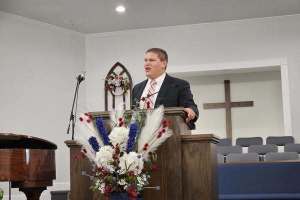The Rise of Christianity in the Global South
Moving the Equator North
Like other northern European countries, Denmark has historically been a homogenous society. Also like its neighbors, this has changed in recent years with the arrival of immigrants from what's called the "Global South."
The religious fervor of some of these immigrants, like that of immigrants to other European countries, has shaken things up among the "notoriously staid" Danes. But if you're thinking this is "another story about Muslims in Europe," guess again.
A recent Washington Post story described the impact that Christians from Africa, Asia, and Latin America are having on the Danes. Immigrants have started more than 150 churches in Denmark. These churches not only minister to foreign-born residents, but increasingly to native Danes as well.
Karsten Nissen, a Lutheran bishop, called the immigrant Christian churches "a gift to our Danish Lutheran Church" that helps Danes understand how Christians are supposed to live.
According to Bess Semer-Pederson, who runs Alpha Denmark, a course that teaches the basics of Christianity, Denmark "[needs] these immigrant churches, because they are bringing a message that we have forgotten."
What's happening in Denmark is only a small part of a larger trend. "Churches in countries such as Nigeria, Ghana, South Korea, and the Philippines have sent thousands of missionaries to Europe to set up churches in homes, office buildings and storefronts." African Anglican bishops are reaching out to conservative congregations in the United States, breaking away from the apostate Episcopal church.
Phillip Jenkins isn't surprised at these developments. Jenkins, a professor of history at Penn State, has chronicled the rise of what he calls "The Next Christendom." As he writes in The New Faces of Christianity: Believing the Bible in the Global South, 60 percent of the estimated two billion Christians in the world live in Africa, Asia, or Latin America. By 2050, there will be an estimated three billion Christians, 75 percent of whom will live in what is the "Global South."
But numbers only tell a part of the story. These Southern Christians have a much stronger belief in the authority of Scripture than their Western counterparts. As a Kenyan bishop said, "Our understanding of the Bible is different from them. We are two different churches."
This belief in biblical authority produces the exuberant faith and the desire to share it that Europeans and Americans desperately need.
It also promises to change Christianity—and not just in the Global South. According to Jenkins, "as the center of gravity of the Christian world moves ever southward, the conservative traditions prevailing in the global South matter even more."
The most visible example is what's happening in the Anglican Communion. Africans are not only dominating the Communion statistically—they are defining the theological agenda, as well.
Along with other non-Western bishops, they are working to transform "two different churches" into one Bible-believing one. A similar process is taking place in Methodist circles.
The author John Updike once said, "I don't think God plays well in Sweden. God sticks pretty close to the equator." Whether or not Updike was right about Sweden (or Denmark), there's one thing he didn't anticipate: that God would bring the equator to them and, in doing that, would remind the West of what it had forgotten.
_________________________________________________
From BreakPoint®, July 16, 2007, Copyright 2007, Prison Fellowship Ministries. Reprinted with the permission of Prison Fellowship Ministries. All rights reserved. May not be reproduced or distributed without the express written permission of Prison Fellowship Ministries. "BreakPoint®" and "Prison Fellowship Ministries®" are registered trademarks of Prison Fellowship





























